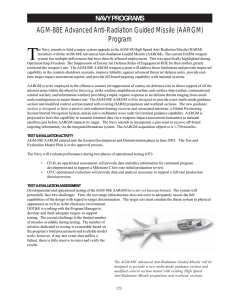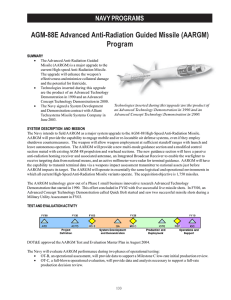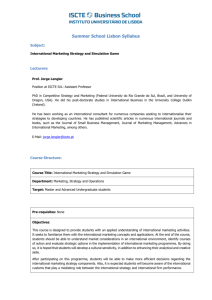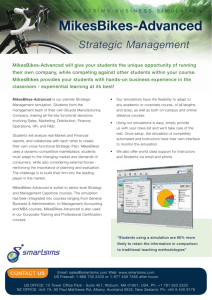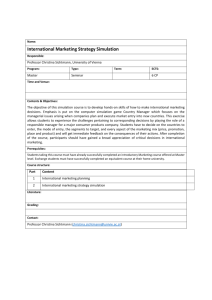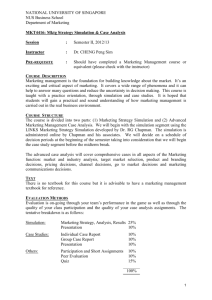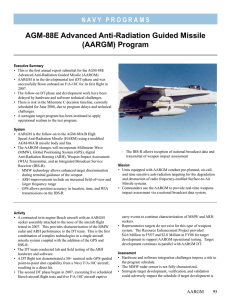Iterative Use of Modeling & Simulation (M&S) and Test & Evaluation
advertisement
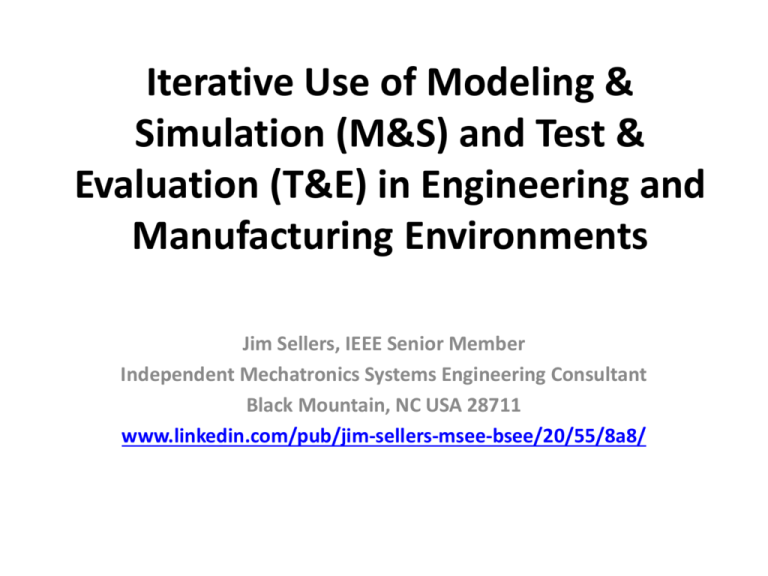
Iterative Use of Modeling & Simulation (M&S) and Test & Evaluation (T&E) in Engineering and Manufacturing Environments Jim Sellers, IEEE Senior Member Independent Mechatronics Systems Engineering Consultant Black Mountain, NC USA 28711 www.linkedin.com/pub/jim-sellers-msee-bsee/20/55/8a8/ Early Computing Technologies Typical IBM 370 Mainframe Components (Courtesy IBM) Keypunch Machine and Keypunch Card (Courtesy Bing) Early Computing Technologies BASIC Terminal and Paper Tape Punch (Courtesy Bing) Electronic Associates Incorporated (EAI) Hybrid Computer (Courtesy Bing) Historical Chronology of Modeling and Simulation • • • • • • • • • Custom FORTRAN and BASIC Code Continuous Systems Modeling Program (CSMP) Advanced Continuous Systems Language (ACSL) Engineering Analysis System (EASY5) Matrixx and Xmath Matlab and Simulink – de facto standards now Maple and Mathcad Mathematica Minitab statistical analysis toolset Matlab Workspace Modeling and Simulation Toolsets • Electronics – – – – PSpice OrCAD Labview Multisim • Mechanical – ProENGINEER – Solidworks • Drafting – I-DEAS – AutoCAD Integration Of Modeling, Simulation, Design Toolsets • Leuven Measurement Systems (LMS) International (Belgium) – Developed Dynamic Analysis and Design System (DADS) – Morphed Into Virtual Lab – Interfaces With Simulink To Create Rapid Prototyping Environment – Bought By Siemens in 2012 • Simscape family Of Products Developed By Matlab To Compete With This Technology Advances – – – – SimMechanics SimElectronics SimPowerSystems SimDriveline Model-Based Systems Engineering • MBSE is a term that predicates the use of modelling to analyze and document key aspects of the Systems Engineering Lifecycle. It is broad in scope, spanning the SE lifecycle and covering levels from System of Systems to individual components. MBSE is a model-centric approach providing a single point of truth which is reflected in a set of living artifacts (Courtesy of INCOSE). http://www.incoseonline.org.uk/Documents/zGuides/Z9_model_based_WEB.pdf AGM-88: High-Speed Anti-Radiation Missile (HARM) AGM-88: High-Speed Anti-Radiation Missile (HARM) AGM-88: High-Speed Anti-Radiation Missile (HARM) • Problem – SAM sites power down if HARM is known to be in area – Have to be able to prosecute all SAM sites at all times • Solution – Add GPS receiver and Inertial Measurement Unit (IMU) to missile control section – Improve flight code and nav software to accommodate lack of GPS information and other abnormalities. • Concerns – Range time for test and evaluation is expensive – Assess effects of any changes in mass properties AGM-88: High-Speed Anti-Radiation Missile (HARM) • Approach – Use all data from old testing and lab evaluations as a starting point – Use present navigation and flight control software as baseline – Determine new mass properties, etc. – Set up 6DOF simulation to assess benchmark cases – Refine simulation with data from lab testing and flight tests at Edwards AFB – Iterate the uses of M&S and T&E to refine model and simulation until its results match test results Conclusions • In the early part of my career, T&E was dominant with respect to M&S activities due to simulation capabilities, limitations, and turn-around times • As computers improved in capabilities and speed and accuracy and ease of access, M&S activities gained importance to the point that they were more advantageous at time that was T&E – T&E efforts took a lot of long-range planning and coordination with lab access and range flight schedules • Model-Based Systems Engineering (MBSE) is the best approach that is used now • December 2006: HARM scores direct hit on simulated emitter at Edwards AFB Team of the Quarter
